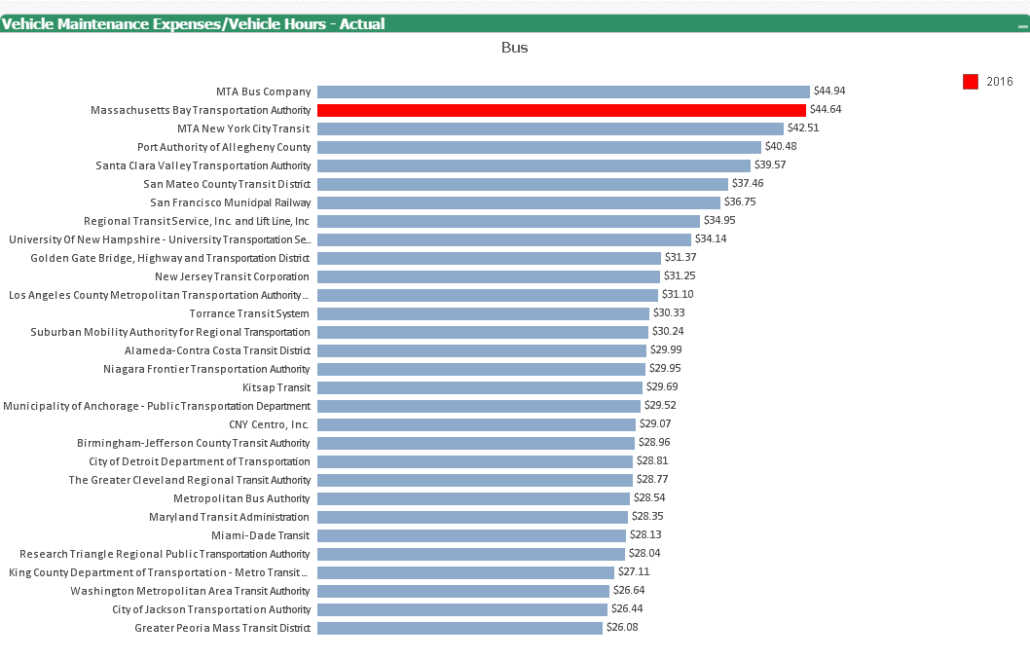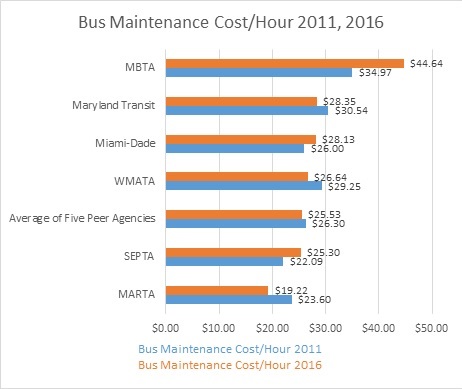2016 MBTA Bus Maintenance Costs up 27% Since 2011
Last spring, Pioneer reported on the MBTA’s out of control 2015 bus maintenance costs, which were the highest of any transit agency in the nation at $44.30 per hour of bus operation. A small consolation prize, according to MBTAanalysis.com, is that New York City’s MTA Bus Company surpassed the MBTA in 2016 by rising from $42.27 in 2015 to $44.94 per hour of bus operation. As the graph below demonstrates, the MBTA still came in a close second at $44.64 per hour of bus operation in 2016.

Pioneer’s study last spring “2015 MBTA Bus Maintenance Costs Were Nation’s Highest,” identified five peer transit agencies (Miami-Dade Transit, Washington Metropolitan Area Transit Authority, Maryland Transit Administration, Southeastern Pennsylvania Transportation Authority, and Metropolitan Atlanta Rapid Transit Authority) using the Integrated National Transit Database Analysis System’s (INTDAS) “likeness scores.”
The “likeness scores” were used to determine which agencies had the highest level of similarity to the MBTA overall and based on individual factors like urban area population, modes operated, and service areas.
The first graph below shows that since 2011, the MBTA’s cost per hour of operation has risen from $34.97 to $44.64, while the average of its five peer agencies actually dropped from $26.30 to $25.53. The second graph represents that this was a 27% increase over the five year period for the MBTA. In comparison, the average of the five peer agencies dropped by 3%.


These findings provide hard evidence in support of the MBTA’s March, 2017 proposal to outsource bus maintenance operations to a third party. Doing so could potentially save tens of millions of dollars in annual costs. Pioneer has found that the MBTA would have saved just over $46.4 million in 2016 if bus maintenance costs per hour of bus operation were reduced to the average of its five peer agencies.
In an interesting twist, the Boston Globe stated on Friday, January 19th, that the MBTA has reached a new collective bargaining agreement with its mechanics’ union. While the procurement process for potential outsourcing of bus maintenance services is still ongoing, it appears that the MBTA may have used the proposal as a bargaining chip in negotiations. A comment from Transportation Secretary Stephanie Pollack was particularly telling; “It is my personal, clear belief that without outsourcing on the table, we wouldn’t have reached this agreement.”
One thing is for sure, the MBTA has a long way to go to bring bus maintenance costs under control.
For more analysis of the MBTA, visit MBTAanalysis.com. We have recently added the most up-to-date information available from the federal government on transit systems across the country.



